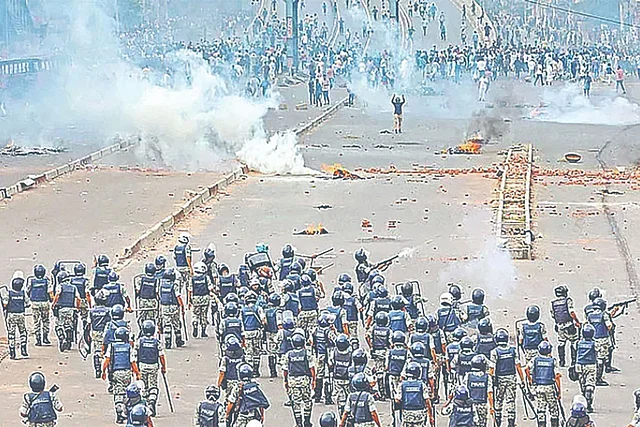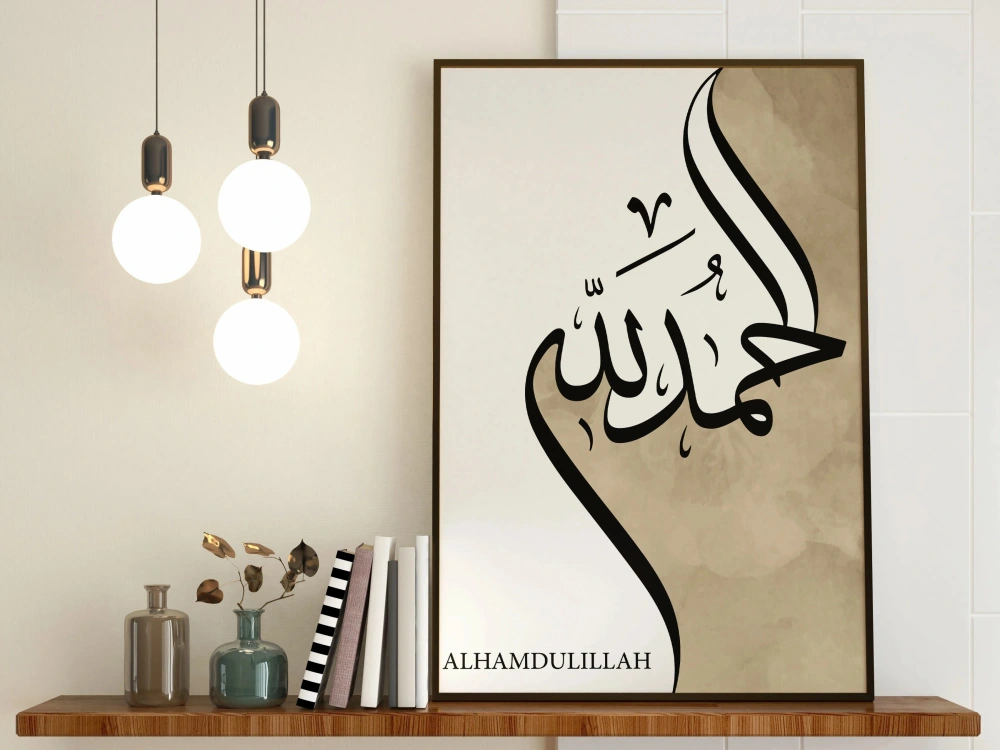In countries with even minimal democracy, law enforcement agencies do not use arbitrary or excessive force against their citizens. They do not have the legal or constitutional right to do so. If they do, it is considered ‘crossing the red line.’ Kallol Mustafa writes about how this ‘red line’ has been crossed in suppressing the recent protests.
Power Arrogance and Unaccountable Governance
The recent example of unimaginable brutality in the quota reform movement, resulting in over two hundred casualties, demonstrates the extreme consequences of power arrogance and unaccountable governance.
The quota reform movement was entirely peaceful. It started in June in response to a high court ruling upholding the quota system in government jobs. The movement remained limited to peaceful marches and gatherings.
However, the ruling government ignored the students’ demands, citing the court ruling, and did not even agree to discussions. As a result, the movement escalated to intermittent road and highway blockades at the beginning of July, yet it remained peaceful.
Violence erupted on July 15 when the ruling party’s student organization, Chhatra League, attacked students with hired thugs at Dhaka University and other public universities.
Six young people were killed on July 16 in clashes between the police, Chhatra League, Jubo League, and the students. Despite this heinous incident, the government did not budge. If the government had realized its mistake at that point and withdrawn the police and Chhatra League-Jubo League from the field and initiated discussions with the protestors about the quota reform demands, the subsequent brutal killings might have been avoided.
Instead, after six lives were lost, the government continued to use force against the protesting students. This resulted in at least 210 deaths within a week due to police and government-supporter attacks and clashes, an unprecedented event in the history of Bangladesh’s protests.
Key Points:
- The movement that began in June due to a high court ruling was limited to peaceful marches and gatherings.
- The public has granted the state the monopoly on the use of force with the condition that it will be used to protect them, not to kill them.
- There is a demand for independent and credible investigations into every killing to hold the responsible individuals accountable.
According to an analysis by Prothom Alo of 175 deaths, most victims of the quota reform movement and subsequent clashes were students and working-class people. Seventy-one percent of the deceased were children, teenagers, and young adults. Among the victims were 22 children and teenagers, including a three-year-old. There were 103 young adults aged 18 to 29. Out of the 175, 46 were students, comprising 26 percent.
Among the 175 deceased, six had direct political affiliations: three with the Awami League and three with the BNP. A significant portion of the victims were working-class individuals, small business owners, shop workers, drivers, laborers, and low-income people, indicating that rising living costs and other socio-economic issues drove them to protest. The most alarming fact is that 137 of the victims, or 78 percent, had fatal gunshot wounds. Comparatively, fewer were killed by rubber bullets and pellets, numbering 22. This suggests that the death toll would not have been as high if lethal bullets had not been used to suppress the protests (78 percent of the deceased had fatal gunshot wounds, Prothom Alo, August 2, 2024).
Typically, during mass protests, when thousands of people take to the streets, there is a belief that law enforcement agencies, no matter what, will not directly shoot at them.
There is less fear when the protest crowd is large because of the collective power of the people and the assumption that state forces would not dare to shoot at a large number of people.
This is considered a ‘red line’ or ultimate boundary. The only exceptions might be military dictatorships or foreign occupying forces. Except for these two cases, law enforcement agencies in any democratic country never cross this ‘red line.’ Modern state law enforcement and military forces possess various lethal weapons—machine guns, tanks, warplanes, helicopter gunships, etc. These can kill many people in an instant. However, no force in any minimally democratic country uses these weapons indiscriminately or arbitrarily against their own people. They do not have the legal or constitutional right to do so.
Crossing this ‘red line’ means breaking the contract between the state and its citizens. The public has granted the state the monopoly on the use of force with the condition that it will be used to protect them, not to kill them.
In such cases, law enforcement agencies in any minimally democratic country use non-lethal weapons. They use tear gas shells, batons, or water cannons to disperse people in various ways.
Even if they have to fire shots, they do not shoot indiscriminately so that protestors, bystanders, shopkeepers, rickshaw pullers, hawkers, or even children standing on rooftops or balconies get killed.
Shooting ordinary people indiscriminately with pellets and rubber bullets, tearing their bodies and destroying their eyes, is something no civilized country’s law enforcement does except for colonial occupying forces. They are supposed to be accountable for every bullet they fire. Once this ‘red line’ is crossed, the legitimacy of the government in power is questioned, both by the country’s people and the international community. The ruling Awami League government has previously used law enforcement against the people on various occasions.
There are allegations of extrajudicial killings, enforced disappearances, repression of opposition political rallies, and even shooting people to death. These are each a ‘red line’ that no democratic government should cross.
This time, however, to protect their vested interests, the government crossed the ‘red line’ with authoritarian arrogance in suppressing the quota reform movement, reaching a completely different level. Suddenly attacking a rally, dragging someone from their home, or conducting a night raid and killing people is entirely different from openly shooting at thousands of angry students and people protesting on the streets for several days.
Despite so many casualties, there has been no credible effort from the government to apologize, acknowledge mistakes, or bring the killers to justice. Analyzing 70 cases, Samakal reported that in the cases filed after the July killings, none explicitly mentioned that the students were killed by law enforcement bullets. Even in the case of Abu Saeed, a student at Begum Rokeya University in Rangpur, who was publicly shot by the police, the FIR stated that Saeed died from bullets and brickbats thrown by the protestors (No mention of student deaths by bullets in any cases; Samakal, July 30, 2024). Not only that, but thousands of people have also been charged without proper investigation, and wholesale arrests of protesting students, working-class people, and opposition party members are ongoing through block raids.
Prothom Alo reported that as of Monday, July 29, 2,630 people had been arrested in 243 cases related to the quota reform movement in the capital Dhaka, of which 2,284 had no political affiliation—meaning 87 percent of those arrested were students, working-class, and ordinary people (87 percent of the arrested in Dhaka have no political affiliation; Prothom Alo, July 31, 2024).
Coordinators of the anti-discrimination student movement were taken into protective custody and made to issue statements withdrawing the movement from the DB office. Students are not even allowed to hold legitimate protest programs against extrajudicial killings, enforced disappearances, false cases, and mass arrests nationwide.
On Monday, July 29, Chhatra League attacked student rallies in various places, police baton-charged, and several students were detained. A student was shot while joining the protest in Cumilla (Protests in various places, baton charge, detentions; Prothom Alo, July 30, 2024).
Through these events, the government is increasingly emerging as more oppressive. While the government attempts to show ‘normalcy’ through the use of force and repression, no country can run this way. International human rights organizations, including the UN, have called for an immediate halt to the ongoing repression and mass arrests of students, ordinary people, and opposition leaders and activists. There is a demand for independent and credible investigations into every killing to hold the responsible individuals accountable.
Since the government itself, including various law enforcement agencies, is accused in these cases, some have demanded that the investigations and trials be conducted under UN supervision to ensure credibility. The government must also consider providing adequate compensation to the families of the deceased, ensuring proper medical treatment for the injured, and taking responsibility for the rehabilitation of those who have become disabled or blind.
- Kallol Mustafa, writer and researcher










